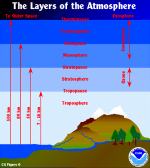|
This section contains 5,521 words (approx. 19 pages at 300 words per page) |

|
Man is able to directly utilize only a small portion of the energy of the Earth's atmosphere. Indeed, excessive concentrated energy in the atmosphere—hurricanes and tornadoes—represents risks to mankind. Most human demands created by atmospheric conditions involve consumption of energy to maintain comfort. The ambient surface air temperature, for instance, determines how much energy is needed for heating or cooling demands and the level of outside ambient illumination determines the need for artificial lighting. Electricity derived from fossil fuels powers the industrialized world Petroleum products directly power most forms of transportation. Pollution emitted by massive fossil fuel consumption affects man's well-being and quality of life on both immediate and long-term time scales, and mitigation this anthropogenic (manmade) pollution using emission-control devices requires even greater energy consumption.
Atmospheric Composition
Unpolluted air contains about 78 percent molecular nitrogen, 21 percent molecular oxygen, 1 percent argon, up to 3 percent water vapor, and...
|
This section contains 5,521 words (approx. 19 pages at 300 words per page) |

|


